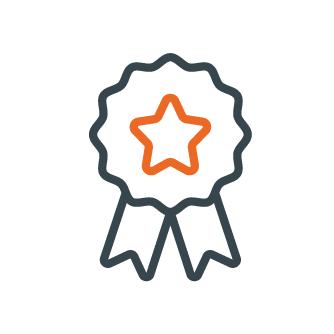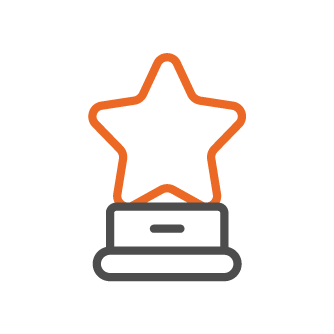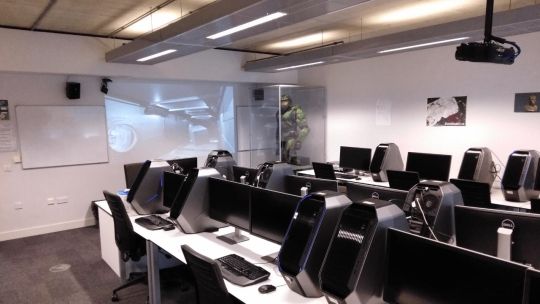BSc (Hons) Software Engineering
- Study Mode: Full Time
- Location: High Wycombe
- Duration: Three or Four Years
- Start Date: September 2024
If you are looking to make an impression in the fast-paced IT world, studying a degree that provides you with a strong foundation in computing and an in-depth specialised knowledge in software engineering, this is a great place to start.
Software is an essential part in controlling computers, it can be a creative way to develop solutions to communication, financial, business, entertainment and healthcare problems. Working in the computing industry developing software is an exciting career that challenges you to use both analytical and creative skills and be at the forefront of the latest technological advances.
Just go for it and be the best that you can be at Bucks. The members of staff are fantastic and support you, as well as state-of-the-art facilities that are open to all. Use everything on offer and nothing will stand in the way of success.Neel Doshi

Why study this subject?
Do you love the idea of creating valuable new applications and software? This BSc (Hons) Software Engineering degree is perfect for you if you have an analytical approach to solving problems. Across the world businesses and organisations rely on complex computer-based systems, and there is an ever-increasing demand for people with the skills to update, maintain and enhance the software. It is essential for qualified professionals to be available to keep national and international economies running. This programme has been carefully designed by our industry expert academics and professional bodies to provide you with the skills and abilities needed to thrive in the fast-moving software industry.
This course is also offered as a four-year programme, including an initial Foundation Year. The Foundation Year will allow you to develop your academic study skills and build confidence in your abilities, identifying your own strengths and development needs for progression onto an undergraduate programme.
This was my best experience of education in my whole academic career. The classes were very interactive and helpful. The learning experience was excellent.
I would like to commend the efforts of the staff and lecturers who give more than 100 % in helping a student. Thanks to the course I learned and explored the horizons of technology and beyond. Without the experience I would not have had the self-confidence and knowledge that has led me to proceed in my professional career.
Nick Rose
Why study at Buckinghamshire New University?
This programme offers you the opportunity to gain a broader understanding and expertise in a range of areas. You’ll focus on the three key disciplines of large-scale software design, development, and delivery based on the up-to-date tools, techniques, and methodologies. You’ll explore all aspects of the software lifecycle, covering both the technical aspects addressing the activities of procurement, requirements capture, design, testing and maintenance, and the nontechnical aspects of project management (scheduling, costing, risks), quality management (standards, inspections) and configuration management. Within this course, you will see how the successful combination of these essential elements will impact upon the current software crisis, by producing quality software systems on-time, within budget and fulfilling the customer’s needs.
We are a student focused and employer-led university which means that you are at the forefront of all that we do. We provide you with a thorough understanding in software engineering to help you graduate ready for employment or further postgraduate study. Recent graduates have gone into industry roles including software development, web design, information systems management and games development.
Our programme is a part of our strong computing school, this means that we are a team of expert lecturers who have vast experience of working in their respective fields. This exciting course allows you to explore the diversity of modern software engineering, gaining the integral skills required for today’s industry workplace. We do not just teach in the classroom; you will increase your knowledge through involvement on real-life projects and gain hands-on experience of working either individually or in a software development team.
You will also get opportunities to expand your knowledge both inside and outside of the lecture theatre. Students have previously visited sites of historical importance, including Bletchley Park, to learn more about the history of computing and how it impacted the world.
What facilities can I use?
BNU has invested in our facilities to ensure that you can learn on industry standard systems and software, meaning that you can make an easy transition from education into employment. Quite simply we are committed to making sure we provide you with the best learning experience possible.
We make sure we keep the University’s computing facilities well maintained and equipped. We have a range of large labs, most filled with dual-screen, dual boot (Windows and Linux) systems. Latest industry standard software is also included on devices to allow you to develop your skills to what is needed in the workplace.
Labs have been custom built to provide the best spaces to nurture the specific skills needed for game and internet development. These allow you to build your skills within key areas of future employment.
Hands-on experience is what we are all about. We have numerous devices that will provide the basis for various supervised projects you will carry out across the programme. These include but are not limited to Virtual Reality headsets, 3D printers, Raspberry Pi microcomputers, EEG headsets.
Furthermore, we provide online facilities to enhance your independent learning, via our Virtual Learning Environment. This will provide you with access to additional material and collaborative learning tools 24/7. And our virtual server technology will allow you to use our operating systems remotely.
What will I study?
During this course you will acquire skills in programming, building secure web and mobile applications and work on team-based software projects; whilst exploiting an agile development approach. You’ll learn how to develop highly dependable and reliable systems, within an object-oriented design approach, using a number of industry standard approaches, such as UML. In addition, you will gain an understanding of the process involved in managing the development of large-scale software projects. Furthermore, specialist modules allow you to explore the areas of artificial intelligence, media programming, real-time systems, cloud computing and security.
Not only will you be learning vital information, you will be learning from innovative, forward-thinking and highly motivated expert lecturers. Our lecturers have close industrial links and all work together to ensure that you have the best possible enriched and stimulating learning environment. To further enhance your education, we invite in guest lectures to share their experience and expertise and host day-long interactive events run by leaders in their field giving you the chance to put your knowledge into action.
Throughout your time with us, you will study a variety of subjects including:
- Application Programming
- Digital Technologies and Professional Practice
- Networking
- User Experience (UX)
- Database Design
- Mobile Apps
- Real-time Systems (Team Project)
- Advanced Programming
- Data Structures and Algorithms
Opportunity modules are a key part of the BNU curriculum. You’ll choose modules in both your first and second year from a broad selection in areas such as sustainability, entrepreneurship, creativity, digital skills, personal growth, civic engagement, health & wellbeing and employment. Opportunity modules are designed to enable you to develop outside the traditional boundaries of your discipline and help you to further stand out from the crowd to future employers.
As you begin to think about life after university and look for employment after graduation we are here to help. We encourage our students to make the most of opportunities that are available during their course, such as guest lectures and internships as these can provide invaluable industry experience and contacts. We also have a brilliant and dedicated Careers and Employment team at BNU who are always on hand to support with application, interview and presentation skills.
As you begin to think about life after university and look for employment after graduation we are here to help. We encourage our students to make the most of opportunities that are available during their course, such as guest lectures and internships as these can provide invaluable industry experience and contacts. We also have a brilliant and dedicated Careers and Employment team at BNU who are always on hand to support with application, interview and presentation skills.
How will I be taught and assessed?
At Buckinghamshire New University we like to foster an interactive and student-focused teaching style where we have a combination of formal lectures, tutorials, practical lab sessions, seminars and guest speakers to enhance the learning experience.
We like to design our course to reflect the workplace so you will have the opportunity to carry out independent study, supported through distance learning technologies such as Blackboard, our Virtual Learning Environment. We will also provide reading lists and suggested resources to enhance independent study.
Assessment will be through a variety of forms, including projects, written exams, written assignments, workshops, and presentations.
You are more than a number at BNU, and we are here to support you through your education journey. We have in place regular contact hours with our tutors and provide you with informal feedback throughout the programme of study.
Over the years of your course you will be assessed and graded in a multitude of ways to allow you to develop and expand on your abilities and skills. Assessments for the various modules will mostly take the form of practical coursework, lab test and written exams. However, the main focus being on testing the practical application of the various concepts and techniques being conveyed.
What are the course entry requirements?
A typical offer will require a UCAS tariff score of: 88 - 112 (Full-time) or 32 - 56 (Foundation Year)
UCAS points can be obtained through qualifications such as A levels, T levels, BTEC or an Access to Higher Education course in a relevant subject. Please list all your qualifications on the application form as you will be asked to provide copies when we receive your application.
A minimum of two full A-levels (or equivalent) is required. Every application is considered on an individual basis. For further details of our international English entry requirements, please visit our international pages.
Applicants who do not meet the minimum requirements for the three-year undergraduate programme, or those who do not feel fully prepared for a degree course, can apply for a four-year programme including a Foundation Year; find out more.
Modules
This provides a guide of the modules that make up your course. You can find more information about how your course is structured on our Academic Advice section.
This course has Opportunity modules.
Opportunity modules are a key part of the BNU curriculum. You’ll choose modules in both your first and second year from a broad selection in areas such as sustainability, entrepreneurship, creativity, digital skills, personal growth, civic engagement, health & wellbeing and employment. Opportunity modules are designed to enable you to develop outside the traditional boundaries of your discipline and help you to further stand out from the crowd to future employers. Find out more.
You must choose 2 x 10 credit Level 4 Opportunity modules from the Opportunity module catalogue www.bnu.ac.uk/oppmodules.
In addition, you must choose 2 x 10 credit Level 5 Opportunity modules from the Opportunity module catalogue www.bnu.ac.uk/oppmodules.
What are the tuition fees
Home
-
Home, Academic Year 2024 - 2025: £9,250 per year
International
-
Overseas/International, Academic Year 2024 - 2025: £15,150 per year
What are my career prospects?
Throughout your time with us we will support you on the route to your chosen career, helping you to develop crucial skills, encouraging you to become enterprising, employable and good leaders.
We are very proud of our reputation for delivering industry standard courses and the success our graduates achieve after leaving the University. This course will provide a first-rate springboard, for your career opportunities to evolve over time. As the role of software engineers is becoming increasingly prolific, this hands-on, highly vocational course provides you with the skills to pursue a career in a variety of sectors, including, commercial, environmental, government, health, education and defence.
Graduates of the degree programme can continue their studies at postgraduate level, or further enhance their employability by obtaining Microsoft Certification™.
There is an increasing demand for qualified specialists in software engineering, meaning that you can expect to graduate with a variety of rewarding career options ahead of you. With the diverse nature of software engineering you can seek out a range of job roles, software development, games development, web design, data analyst, test engineer, systems administrator, information systems management and business analysis.
Course leader











